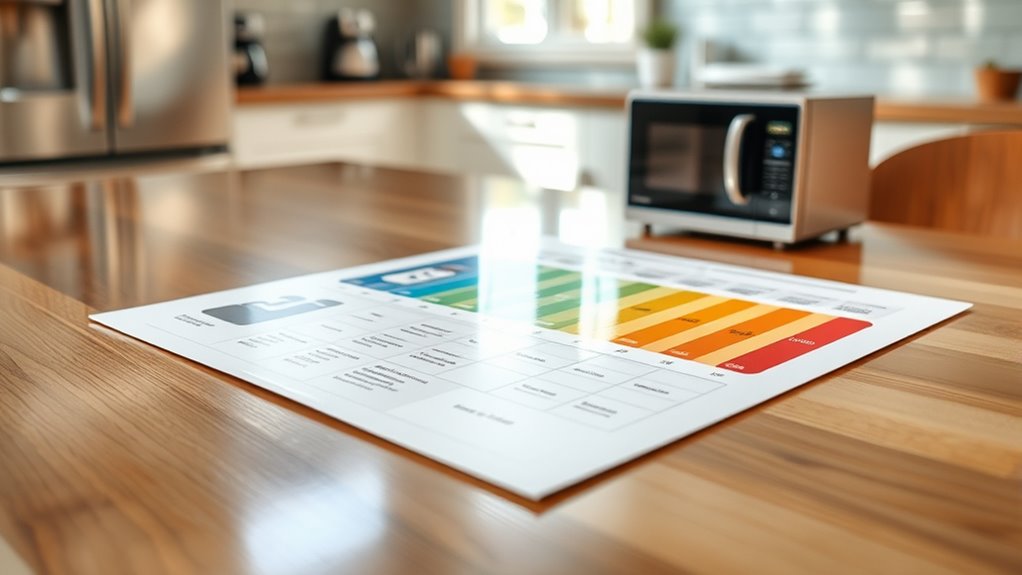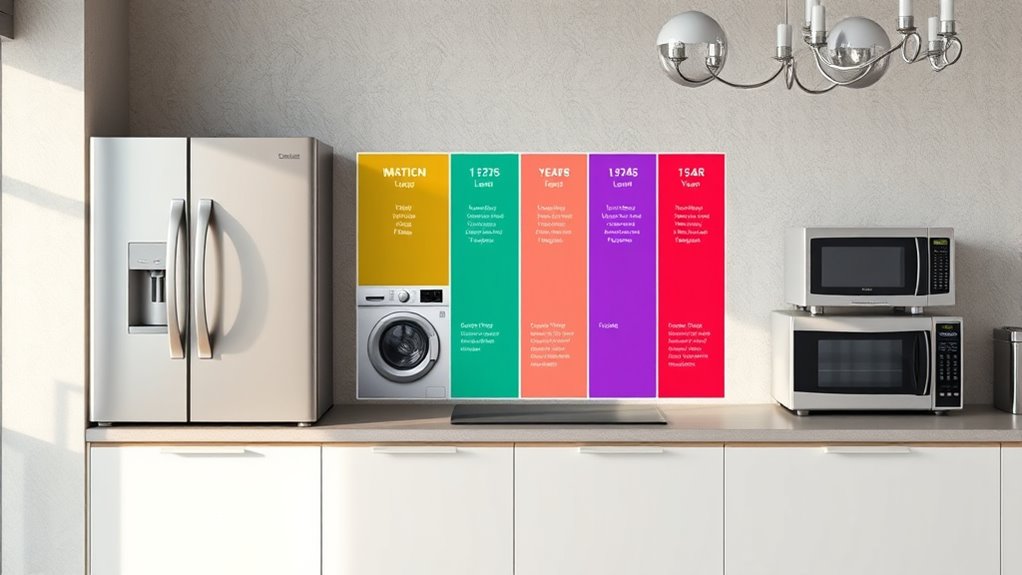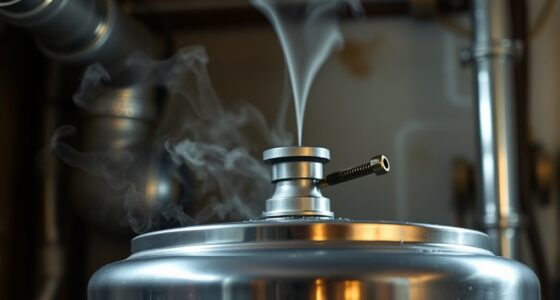Your appliances have typical lifespans you should know about. For example, refrigerators usually last 10–15 years, dishwashers about 9–12 years, and washing machines 8–12 years. Small appliances like microwaves may last only 5–7 years. Proper upkeep, like cleaning and inspections, can extend their life. Understanding these timelines helps you plan replacements and avoid surprises—keep going to discover more tips for maximizing your appliances’ durability.
Key Takeaways
- Major appliances like refrigerators (10–15 years) and ovens (13–15 years) generally last longer than small appliances.
- Small appliances such as microwaves and toasters typically have a lifespan of 5–7 years.
- Proper maintenance, including regular cleaning and inspections, can significantly extend appliance longevity.
- Usage frequency, quality, and brand influence how long appliances last before needing replacement.
- Monitoring performance and addressing issues early helps prevent costly repairs and prolongs appliance lifespan.

Ever wondered how long your household appliances are likely to last? It’s a common question, especially when you’re trying to plan your budget or decide when to replace an aging machine. The lifespan of appliances varies based on their type, quality, usage, and how well you care for them. Understanding these timeframes can help you make smarter decisions about maintenance and upgrades. For example, focusing on energy efficiency isn’t just about saving money on your bills; it also relates to how long your appliances will serve you before they need replacing. Well-maintained appliances tend to run more efficiently, consume less energy, and last longer, so investing in regular maintenance tips can extend their lifespan considerably.
Most appliances have an expected lifespan that can serve as a useful guideline. Refrigerators, for instance, typically last about 10 to 15 years. If your fridge is approaching the 10-year mark, it might be time to start considering a replacement, especially if it’s no longer energy-efficient or if repairs become frequent. Dishwashers usually last around 9 to 12 years, but their longevity can be optimized with proper maintenance like cleaning filters and checking hoses regularly. Washing machines tend to last 8 to 12 years, and taking care of them by avoiding overloading and using the correct detergents can prevent early breakdowns. Ovens and ranges generally last 13 to 15 years, especially when you keep them clean and perform routine inspections of burners and heating elements.
Most appliances last between 8 and 15 years with proper maintenance.
Small appliances like microwaves and toasters tend to have shorter lifespans—about 5 to 7 years—so if they start malfunctioning or become less efficient, replacing them might be a better choice than repairs. Air conditioners and furnaces are more substantial investments, typically lasting 15 to 20 years, but their efficiency can decline over time. Regular maintenance tips like cleaning filters, scheduling professional inspections, and ensuring proper ventilation can help these units operate efficiently for longer periods. Additionally, choosing appliances from reputable Appliances Connection retailers can ensure better quality and longer-lasting performance.
Ultimately, keeping your appliances in good shape not only prolongs their lifespan but also helps you save energy and reduce utility costs. Regular maintenance tips, such as cleaning, checking for leaks, and replacing worn parts, are essential. Staying attentive to signs of declining performance can prevent costly repairs and premature replacements. When you combine proper care with an understanding of their expected lifespan, you’ll be better equipped to plan replacements, maintain energy efficiency, and keep your household running smoothly.
Frequently Asked Questions
How Can I Extend My Appliances’ Lifespan Effectively?
To extend your appliances’ lifespan, focus on maintaining their energy efficiency and reducing repair costs. Regularly clean filters, vents, and coils, and follow the manufacturer’s guidelines for upkeep. Address minor issues promptly to prevent costly repairs later. By keeping your appliances running smoothly and efficiently, you not only save money on repairs but also guarantee they last longer, providing reliable service for years to come.
Are There Signs Indicating My Appliance Is Nearing the End of Its Life?
You might notice early warning signs that your appliance is nearing the end of its lifespan, such as strange noises, increased energy bills, or frequent breakdowns. These signs indicate it’s time to inspect and consider repairs or replacements. Understanding the typical appliance lifespan helps you stay proactive. Keep an eye out for these indicators, so you can address issues early and extend your appliance’s useful life, saving you money in the long run.
Does Brand Name Influence the Durability of Appliances?
You might wonder if brand name impacts an appliance’s durability. Generally, brand reputation plays a role, as trusted brands often prioritize quality. However, it’s also about price vs. durability; higher-priced models may last longer, but some affordable brands are dependable too. Do your research, read reviews, and consider warranties. Ultimately, selecting a reputable brand with a good balance of cost and durability helps ensure your appliance lasts longer.
What Maintenance Routines Best Prolong Appliance Longevity?
You might think regular maintenance costs more than it’s worth, but it actually saves you money by boosting energy efficiency and reducing repair costs. To prolong your appliances’ lifespan, clean filters and vents regularly, check for leaks, and follow manufacturer guidelines. These simple routines prevent breakdowns, keep your appliances running smoothly, and ensure they last longer—so you get the most value out of your investment and avoid costly repairs down the line.
How Do Usage Patterns Impact Appliance Lifespan?
Your usage patterns directly impact your appliance’s lifespan. Frequently overusing or running appliances beyond recommended limits can lower energy efficiency and increase repair costs over time. By using appliances wisely—such as avoiding overloading and following manufacturer instructions—you help extend their longevity. Proper usage not only maintains efficiency but also prevents premature wear, saving you money and ensuring your appliances stay functional longer.
Conclusion
So, next time your fridge conks out just after the warranty ends or your washer throws a fit right before your big move, remember—appliances are clearly living on borrowed time. Who knew that your toaster’s “lifespan” was really just a gentle suggestion? Maybe it’s time to embrace the chaos and buy that fancy new gadget you don’t need, because clearly, appliances are just ticking time bombs waiting for their moment to surprise you.









